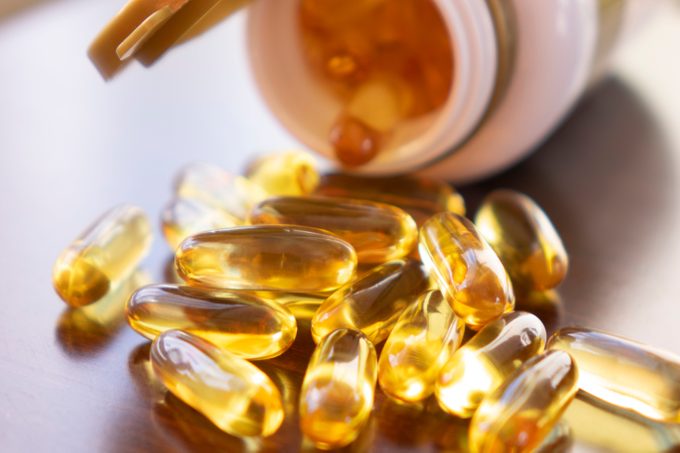What Is Fish Oil Actually Good For?
Tons of vitamins and supplements crowd shelves with various health and wellness claims. Fish oil supplements are a popular one—but what is fish oil good for? Here's everything you need to know.

What is fish oil?
Fish oil is fish fat extract, explains Alyssa Pike, RD, manager of Nutrition Communications for the International Food Information Council Foundation. This oil is rich in omega-3 fatty acids, including eicosapentaenoic acid (EPA) and docosahexaenoic acid (DHA). Essential fatty acids, like EPA and DHA, only come from foods like fish or dietary supplements. They are present in several supplements including fish oil, cod liver oil, krill oil, and vegetarian products that contain algal oil, Pike says. That’s why omega-3’s are one of the 13 vitamins and supplements doctors take every day.
What is fish oil good for?
One of the reasons fish is part of a healthy diet is because of their oil. The omega-3’s are specifically important because they play a special role in our cells, Pike says. EPA and DHA specifically support eye, brain, and heart health, she adds. Malina Malkani, MS, RDN, CDN notes that some evidence also shows fish oil provides relief for rheumatoid arthritis symptoms. Other studies suggest fish oil supplements may improve the symptoms of mental health conditions or disorders including depression, bipolar disorder, and schizophrenia, says Malkani, creator of the Wholitarian Lifestyle. These are just some answers to “what is fish oil good for?” (This easy chart will tell you which fish have the most omega-3s.)
Are fish oil supplements the same as eating fish?
Fish oil and omega-3’s are just part of the reason why fish itself is so healthy. Unlike the supplements, whole fish contain more vitamins and minerals than only EPA and DHA, according to Harvard Medical School. That’s why the Dietary Guidelines for Americans includes eating four ounces of fish twice a week, not necessarily the supplement version. Both Pike and Malkani advocate for getting nutrients from food first. Still, if that’s not possible, fish oil supplements could be a good substitute for meeting your omega-3 needs, Malkani says. Just note that eating the whole fish offers more, nutritionally, than the supplement alone.
What should I do before taking fish oil pills?
If you decide fish oil might be an excellent addition to your diet, consult with your doctor before buying or trying any supplements. In some people, it interacts with drugs that affect blood clotting, Malkani says. Some fish liver oil supplements are high in vitamin A, too. Over time, consuming large amounts of vitamin A could cause health issues like liver damage and bone pain, among others, according to Malkani.
Once your doctor approves, it’s time to wade through the many fish oil supplements on the market. Both Malkani and Pike say that supplement quality varies greatly, so it’s important to check the labels. Look for fish oil pills that have been third-party tested for purity, or that carry a seal of purity from the Global Organization for EPA and DHA omega-3’s. Once you have a good supplement, keep them at room temperature.
Next, find out the signs you might not be getting enough vitamin D.




